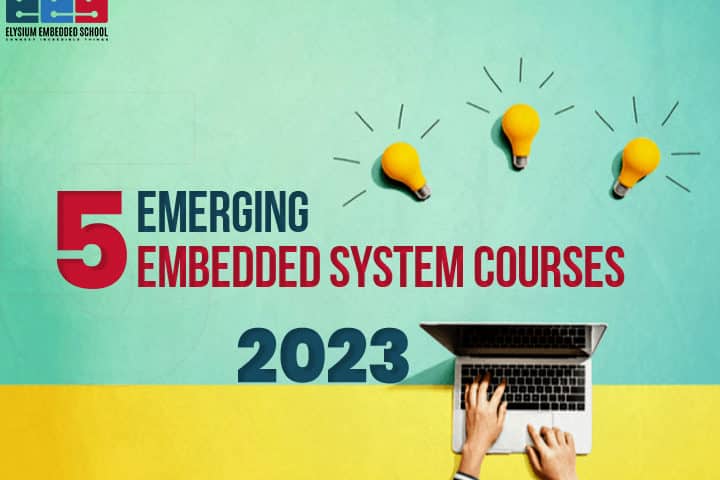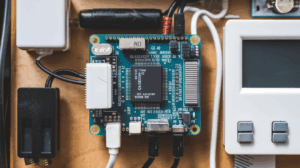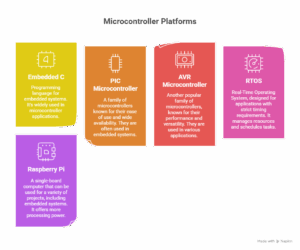
IoT Career Opportunities: Ultimate Guide 2023
July 28, 2022
Get Deep Knowledge in Advance Microcontroller Training Course
January 5, 2023As the need for faster and more efficient high-performance computers increases, the dimensions of the form aspects that include them continue to reduce. For years now, computer engineers have been allotted the challenging task of incorporating increasingly powerful computers into and onto smaller chassis and printed circuit boards (PCBs), especially to satisfy a growing demand for more loyal, affordable, size-conscious, energy-efficient, and cost-effective computers systems. As a result, we continue to see the boundary-pushing size, weight, power, and cost (SWaP-C) developments within embedded systems.
Here, we will talk about five Emerging Embedded System Courses. Embedded systems, also learned as embedded computers, are small-form-factor computers that power typical tasks. They may function as standalone machines or as part of more extensive systems, hence the term “embedded,” and are usually used in applications with size, weight, power, and cost (SWaP-C) limitations. Embedded systems are categorized and established on performance and functional necessities, as well as the performance of microcontrollers. These varieties can also be divided into categories and subcategories.
As the demand for cutting-edge innovation grows, Embedded System Courses have become essential in equipping engineers with the skills to address real-world challenges in compact, high-efficiency computing. These courses provide the necessary foundation to understand how to design and optimize systems with minimal size, weight, and power consumption. From sensor integration to real-time response mechanisms, Embedded System Courses prepare learners to work on industry-relevant applications in sectors like aerospace, automotive, and healthcare, where performance and compactness are critical.
Moreover, with the evolution of embedded technology toward smart devices and IoT, Embedded System Courses are becoming increasingly specialized, offering modules on microcontroller programming, embedded Linux, and advanced RTOS applications. These programs empower students and professionals to stay ahead in a competitive job market. As more industries rely on embedded technologies, Embedded System Courses not only bridge the gap between theoretical knowledge and hands-on implementation but also ensure that learners can contribute meaningfully to next-gen innovations. Enrolling in Embedded System Courses today is a strategic move toward securing a future-proof career in the dynamic tech landscape.
Table of Contents
5 Important Embedded System Courses Overview
1. Embedded C
Embedded C is a powerful extension of the C programming language, specially optimized for developing embedded system applications. It allows developers to write efficient code that can directly interact with microcontroller hardware. Learning Embedded C provides the foundation to understand how embedded software controls hardware components, making it an essential skill for programming microcontrollers and real-time systems. This course typically focuses on syntax, memory management, I/O handling, and practical coding practices using industry-standard tools.
2. PIC Microcontroller
PIC Microcontrollers (Peripheral Interface Controllers) are widely used in automation, robotics, and electronic device development due to their flexibility and low cost. The PIC Microcontroller course introduces learners to programming, interfacing, and circuit development using PIC series chips. It includes lessons on timers, ADCs, PWM, and communication protocols like UART, I2C, and SPI. The course helps build a strong understanding of hardware-software integration in embedded applications.
3. AVR Microcontroller
AVR Microcontrollers are known for their high-speed processing, energy efficiency, and simplicity in design. An AVR Microcontroller course helps learners explore programming concepts using AVR Studio or Atmel Studio, and work with registers, interrupts, and peripherals. The course covers applications in home automation, consumer electronics, and communication systems. With its broad application scope and practical emphasis, it’s ideal for students aiming to build real-time embedded projects.
4. RTOS (Real-Time Operating System)
RTOS plays a crucial role in embedded systems where tasks must be executed within precise time constraints. This course delves into task scheduling, multitasking, inter-task communication, and memory management. Learning RTOS is essential for engineers working on time-sensitive systems such as medical devices, automotive controls, and industrial automation. The course enhances your capability to design predictable and reliable embedded applications, a skill highly valued in critical system development.
5. Raspberry Pi
Raspberry Pi is a versatile, credit-card-sized computer used widely in embedded development, IoT projects, and educational tools. A Raspberry Pi course teaches students how to set up and program the Pi, interface sensors and modules, and develop Python-based applications. It’s particularly useful for creating smart home systems, robotics, and AI-powered devices. This course empowers learners to transform innovative ideas into functional prototypes using a low-cost and scalable platform.
Overview of Embedded Systems Course
Hands-On Practical Learning
The Emerging Embedded System Courses are designed to equip students with essential practical experience. Through interactive lessons and lab sessions, learners gain the ability to design, implement, integrate, and test embedded system software. The curriculum emphasizes building real-world skills that are directly applicable in the embedded technology industry.
Comprehensive Design Lifecycle Understanding
These courses offer an in-depth exploration of the complete design lifecycle of embedded systems. Students are introduced to multi-objective and multi-discipline system design, including requirement analysis, hardware-software co-design, and final system testing. The course structure ensures that learners understand each phase of embedded system development with clarity and hands-on involvement.
Industry-Relevant Skill Development
The Embedded System Courses at institutions like SMEClabs or Elysium Embedded School align closely with current industry demands. By combining theoretical concepts with real-time project experience, students are trained to meet the challenges of modern embedded applications, ranging from consumer electronics to industrial automation.
Career-Focused Curriculum
Designed to enhance employability, these courses prepare students for roles in embedded software and hardware engineering. With a focus on both microcontroller programming and embedded software integration, the training ensures learners are industry-ready and confident to take on roles in core technical sectors.
Here’s an improved and expanded version of the Benefits of Emerging Embedded System Courses section, rewritten for clarity, impact, and depth:
Benefits of Emerging Embedded System Courses
Enhanced Career Opportunities in Embedded Systems
Enrolling in Emerging Embedded System Courses opens the door to a vast range of career opportunities. With embedded systems playing a critical role in industries such as automotive, aerospace, consumer electronics, healthcare, and telecommunications, trained professionals are in high demand. These courses equip learners with the technical know-how and hands-on experience required to secure high-paying, stable jobs in these sectors.
Mastery of Embedded System Administration Skills
A key benefit of these courses is the development of embedded system administration skills. Learners gain insights into system-level programming, memory management, real-time processing, and device interfacing. With this solid foundation, students are prepared to manage and optimize embedded environments efficiently, making them valuable assets to employers across the globe.
Specialization in High-Tech Fields like Robotics and IoT
By taking Emerging Embedded System Courses, learners can steer their careers toward cutting-edge domains like robotics, industrial automation, and the Internet of Things (IoT). The curriculum often includes modules on sensor integration, actuator control, real-time data processing, and machine-to-machine communication, enabling students to build intelligent, responsive systems.
Real-Time Project Experience and Hands-On Learning
One of the core strengths of these programs is their emphasis on real-time projects. Students work on live embedded system applications such as home automation, robotic arms, or wireless sensor networks. This hands-on learning boosts confidence and provides a clear understanding of how theory is applied in actual embedded product development.
Improved Problem-Solving and System Design Capabilities
The courses also foster critical thinking and system-level problem-solving skills. Through complex project work and simulation-based exercises, learners refine their ability to debug embedded systems, write efficient code, and design scalable architectures. These problem-solving skills are critical for long-term success in core engineering and R&D roles.
Global Relevance and Industry Recognition
Most Emerging Embedded System Courses are designed with international standards in mind. Certifications and skillsets obtained from recognized institutions like Elysium Embedded School are respected by top companies globally. This means graduates are not only employable in local firms but are also eligible for opportunities with international tech companies and multinational corporations.
Strong Foundation for Advanced Studies
Finally, these courses serve as a solid stepping stone for further education. Whether pursuing a master’s degree in embedded systems or diving deeper into niche areas like embedded AI or cybersecurity, students who complete embedded courses have the groundwork necessary to excel in advanced academic or research programs.
Embedded System Courses
Embedded System Courses are specialized training programs designed to teach students and professionals how to design, develop, and deploy embedded hardware and software systems. These systems are built to perform dedicated functions within larger mechanical or electrical systems—examples include automotive control units, home automation devices, industrial machines, and IoT applications. The courses cover essential topics such as microcontroller programming, embedded C, real-time operating systems (RTOS), and system debugging techniques. Learners gain hands-on experience with tools like Raspberry Pi, ARM, and PIC microcontrollers, making them industry-ready.
With the rise of smart technology, Embedded System Courses are becoming increasingly important in preparing candidates for high-demand roles in electronics, robotics, and automation industries. These courses equip learners with the practical knowledge to design compact, power-efficient systems tailored to real-world applications. Whether you’re an engineering student, a recent graduate, or a working professional, enrolling in an embedded systems course can significantly boost your career opportunities by aligning your skills with modern technological advancements.
Today’s tech-driven industries are increasingly dependent on skilled professionals trained through Embedded System Courses. These Embedded System Courses provide a strong foundation in designing integrated solutions that meet both commercial and industrial needs. By offering real-time project experience and exposure to cutting-edge tools, Embedded System Courses ensure that learners are equipped with both theoretical knowledge and practical skills. Students can specialize in various domains through Embedded System Courses, including automotive electronics, consumer gadgets, and IoT product development. Furthermore, many universities and training institutions now prioritize Embedded System Courses as core components of their engineering curriculum. Ultimately, Embedded System Courses are the gateway to a rewarding and future-proof career in embedded technology.
What is a Microcontroller?
In the most basic term, a microcontroller is an integrated circuit consisting of a microprocessor, a memory unit, and associated circuits, allowing it to control and handle some or all of the functions of an electronic machine or a system.
Five types of the Microcontroller
- PIC Microcontroller
- ARM Microcontroller
- 8051 Microcontroller
- AVR Microcontroller
- MSP Microcontroller
Here we clarify PIC & AVR Microcontrollers.
1. PIC Microcontroller
PIC (Peripheral Interface Controller) Microcontrollers are developed by Microchip Technology and are highly popular in embedded system applications due to their low cost, versatility, and ease of programming. These microcontrollers are used extensively in industrial automation, consumer electronics, and robotics. They offer features like timers, analog-to-digital converters, pulse-width modulation, and multiple serial communication options. Their reliability and wide community support make them a favorite for both beginners and professionals.
2. ARM Microcontroller
ARM Microcontrollers are based on the ARM architecture developed by ARM Holdings. These microcontrollers are known for their high performance, power efficiency, and scalability. They are widely used in mobile devices, automotive systems, and embedded applications requiring advanced computing capabilities. With 32-bit processing power, ARM microcontrollers support real-time operations and are suitable for IoT applications, wearable devices, and high-end embedded products.
3. 8051 Microcontroller
The 8051 Microcontroller is a legacy 8-bit microcontroller developed by Intel and is still widely used in academic and industrial environments due to its simplicity and robustness. It features an integrated CPU, RAM, ROM, timers, and I/O ports, making it ideal for learning basic embedded system concepts. Despite being older, it forms the foundation for understanding microcontroller architecture and programming.
4. AVR Microcontroller
AVR Microcontrollers, developed by Atmel (now part of Microchip), are designed with high-speed processing capabilities and efficient power consumption. They use the Harvard architecture and are known for being easy to program with a user-friendly interface. AVR microcontrollers are ideal for developing compact, real-time embedded applications. They also offer better performance in comparison to PIC in many areas, making them preferred for complex projects.
5. MSP Microcontroller
MSP (Mixed Signal Processor) Microcontrollers, developed by Texas Instruments, are optimized for ultra-low-power applications. They are used in battery-operated devices, medical instruments, and portable measuring tools. MSP microcontrollers offer a range of features like low power modes, high-precision ADCs, and an extensive set of peripherals. Their efficiency and performance in analog signal processing make them suitable for critical embedded tasks requiring extended battery life.
Embedded C
Embedded C is the most famous embedded software language in the world. It is used to develop microcontroller-based applications. Most embedded software is documented in Embedded C. Embedded C is very similar to C- if you know C, you won’t have difficulty learning Embedded C. This course can help you understand the microprocessor domain. This course’s priority is on the proficiency and skills needed to explain the functioning of the Embedded system. In addition, Elysium Embedded School offers an Embedded C certification Course. It helps increase your developing skill with the most useful guidance help.
The convenience of Embedded C
- It is very simple to understand
- It eases the sophistication of the program.
- It is easy to Understand
- it is transportable from one controller to another
PIC Microcontrollers
PIC Microcontrollers (Programmable Interface Controllers) are electronic circuits that can be programmed to accomplish various tasks. For example, they can be programmed to be timers or control a production line. They are found in most electronic devices, such as alarm systems, computer control systems, phones, and almost any electronic device. Many PIC Microcontrollers exist, although the best are probably found in the GENIE range of programmable Microcontrollers. The Elysium Embedded School training program gives an in-depth knowledge of PIC’s basic concepts and provides the Training certificate.
AVR Microcontroller
The microcontroller is used for high-speed signal processing in the embedded system. It forms the major component and tool useful in designing the embedded system. AVR Microcontroller is an electronic chip with various advantages over other Microcontrollers. AVR Microcontrollers are four times faster than PIC Microcontrollers. Moreover, they use low power consumption and can operate in different power-saving modes. Elysium Embedded School gives training for AVR programming courses.
Advantages of AVR microcontroller
- These microcontrollers have high-speed and high performance.
- Easy to program
- Extensive detailed datasheets
- Very simple to use and has less cost.
- Many different Peripherals
- Its performance is fast
RTOS
In several software applications, especially embedded applications, the operating system is needed to support the application to meet the timing constraints. The operating system performs this by deploying suitable scheduling algorithms. However, a significant problem arises when real-time tasks share resources. Priority inversions can take place in this case unless suitable techniques are deployed. Therefore, we first discuss the important real-time task/thread scheduling algorithms and resource-sharing protocols, starting with a brief introduction to real-time operating systems. Our Training course helps to develop your skill for the RTOS professional.
Benefits of RTOS
- Efficiency
- Availability
- Task Management
- Less Downtime
- Reliability
Raspberry Pi
Raspberry Pi is a series of microcomputer models that can associate with standard monitors and peripherals for varied applications. The Advantages & Disadvantages of Raspberry Pi are that it may be a low-cost, credit-card-sized computer, i.e., capable of a little device that enables people to explore computing and learn how to program in terminologies like Scratch and Python. This microcomputer is useful for small enterprises that run on lower funding to operate their product or to design new technology that embeds the product. In addition, small business owners can automate any small task. Elysium Embedded School, The International Training Institute, delivers a Raspberry pi training Course, which helps improve your skills.
Uses of Raspberry Pi
- Build Hardware Projects
- Do home Automation
- Controlling IoT Robots
- Clusters and Edge Computing
- Learn Programming skills
1. What are the prerequisites to join Emerging Embedded System Courses at Elysium Embedded School?
Basic knowledge of C programming and electronics is recommended but not mandatory. Our courses are structured for both beginners and advanced learners, with step-by-step guidance and hands-on projects to build foundational understanding and professional skills.
2. What kind of certification will I receive after completing the embedded system courses?
Upon successful completion of the training, students will receive a certification from Elysium Embedded School, which is recognized by leading industries and adds value to your resume when applying for jobs in embedded systems, robotics, and IoT.
3. Do these courses include real-time project work or just theory?
Yes, all Embedded System Courses at Elysium Embedded School include real-time project implementation. Whether it’s Embedded C, PIC, AVR, RTOS, or Raspberry Pi, students will work on real-world scenarios to gain practical expertise aligned with industry requirements.
4. What career opportunities are available after completing these embedded courses?
After completing courses like PIC, AVR, and RTOS, students can pursue roles such as Embedded System Developer, Firmware Engineer, IoT Engineer, RTOS Specialist, or Embedded C Programmer. Elysium Embedded School also offers placement support to help you land a role in top MNCs and startups.
5. Why should I choose Elysium Embedded School for embedded system training?
Elysium Embedded School stands out due to its industry-aligned curriculum, experienced trainers, practical learning approach, and placement support. With expert mentorship and certification, students get the advantage of becoming job-ready in today’s competitive embedded system market.
Conclusion
Elysium Embedded School stands as the premier destination for mastering the wide-ranging concepts of Embedded System Courses. With experienced mentors and industry-aligned training, students are guided to build strong technical foundations and gain real-world skills that enhance employability. These Embedded System Courses not only equip learners with hands-on project experience but also prepare them to meet the evolving demands of the embedded industry.
Whether your interest lies in Embedded C, PIC, AVR, RTOS, or Raspberry Pi, the Embedded System Courses offered by Elysium Embedded School open doors to specialized career paths in core electronics and automation sectors. Our structured programs ensure that every student understands the practical and theoretical aspects of embedded technologies.
By enrolling in Embedded System Courses, students can strengthen their resumes with in-depth technical skills and relevant project exposure. These programs are essential for career advancement and are tailored to help you stand out in a competitive job market. The emphasis on practical training and embedded design ensures that learners become job-ready professionals.
For anyone aspiring to excel in embedded technology, choosing Elysium Embedded School’s Embedded System Courses is a decisive step toward a successful and innovative career. Start your journey today and unlock a world of opportunities in the embedded domain through our expertly crafted Embedded System Courses.













